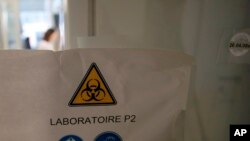The World Health Organization reports a vaccine to protect against the deadly coronavirus, COVID-19, could be available in 18 months. More than 400 scientists are attending a two-day meeting in person and virtually to come up with a research strategy for accelerating the development of therapeutics to contain the deadly virus. The latest reports put the number of confirmed cases at 42,708, including 1,017 deaths, mostly inside China. Another 391 cases in 24 countries and one death are confirmed outside China.
WHO chief, Tedros Adhanom Ghebreyesus says he does not expect the scientists will be able to provide immediate answers to the many questions surrounding this novel coronavirus. But he says he expects they will provide a research roadmap on what needs to be done to bring this fast spreading disease to an end.
He says developing vaccines and therapeutics to protect people against the virus and treating those who are sick is important. But he notes that will take time—time in which the virus will continue to circulate relentlessly around the world.
“But in the meantime, we are not defenseless," he said. " There are many basic public health interventions that are available to us now, and which can prevent infections now. For instance, the first vaccine could be ready in 18 months, so we have to do everything today using the available weapons to fight this virus.”
Tedros says WHO is helping countries prepare for the possible onset of the disease by strengthening their lab capacities so they can quickly diagnose the virus. He says thousands of health workers are being trained on how to treat the ill. And, he adds people can protect themselves by employing a number of simple measures. These include washing hands with soap and water and staying away from people who are coughing and sneezing.
He says WHO and a couple of sister agencies have agreed on a name for the coronavirus. From now on it will be called COVID-19.
“We had to find a name that did not refer to a geographical location, an animal, an individual or group of people, and which is also pronounceable and related to the disease," he said. "Having a name matters to prevent the use of other names that can be inaccurate or stigmatizing.”
Tedros is calling on nations to generously support WHO’s appeal for $675 million. He says this money is needed to help poorer countries strengthen their fragile health systems so they can keep the dangerous virus at bay.
He says investments must be made now to stop the outbreak in its tracks. If the virus invades weaker health systems, he warns it will create havoc around the world.




